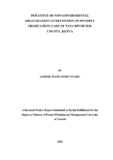| dc.description.abstract | The study sought to establish Influence of NGOs intervention on poverty eradication in Tana River Sub- County. NGOs have been regarded as the new alternative after the government, for people centered pro-poverty eradication in Kenya. While there are some successes in addressing the environmental risks by providing clean water, sanitation services, providing health services, and building social capital of the low-income households excluded from government services and policies on poverty reduction. There is a need to include the community in design and implementation of poverty reduction programmes, and the need to adopt an integrative approach that not only delivers programmes based on service delivery, as the current focus, but that complements this with a stronger role in advocacy and policy influence. This study focused on the influence of NGOs intervention on poverty eradication in Tana River Sub- County and pointed out the challenges that have so far undermined their success. The research design for the study was descriptive survey. The target population was those households that had benefited from NGOs interventions totaling to 1300. Proportionate stratified sampling was used to form the sample size and simple random sampling was applied on the sample to select the respondents in the study. A sample of 210 respondents were selected. The research instruments used were questionnaires and observation guide. To ascertain validity and reliability of questionnaires, a pre-test survey was conducted with 16 respondents who did not constitute the sample population but representing all those who had benefited from NGOs interventions in the Sub-County. Responses in the questionnaires were processed by use of a computer Statistical Package for Social Science (SPSS) version 20.0 programme to analyze the data. Quantitative data was analyzed using descriptive statistics that included, tables, frequencies, averages, percentages, modes and median. The findings revealed that NGOs interventions on education, health and sanitation, food, diet and community empowerment have assisted on poverty eradication in the County. Therefore the study concludes that NGOs interventions have influence on poverty eradication in Tana River Sub- County. The study recommends that NGOs to engage the stakeholders more to harmonize its goals and objectives, work towards self-sustainability to avoid incomplete implementation due to inadequate resources and to develop a clear policy on NGOs at national level. | en_US |

